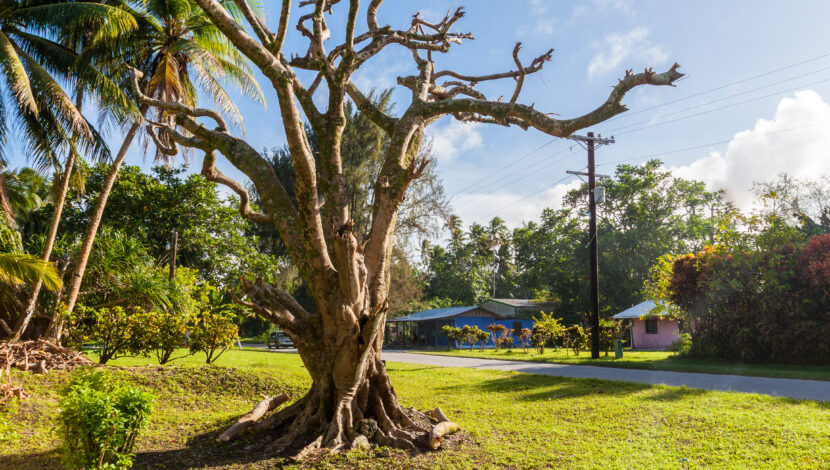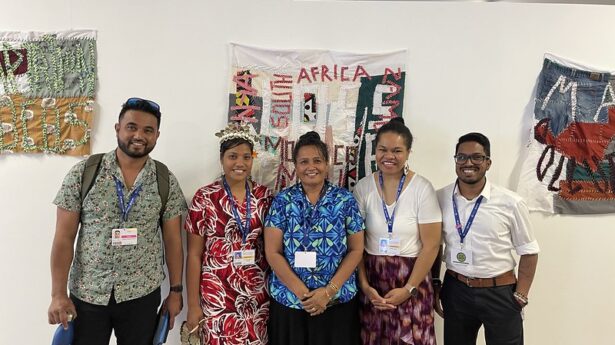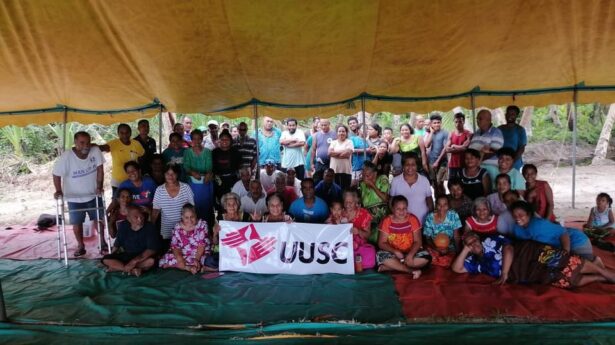The Unitarian Universalist Service Committee advances human rights through grassroots collaborations.
What Did Marshallese People Do to Deserve This?

By on April 16, 2024
Lis-Marie Alvarado, UUSC senior partnership officer for climate and disaster justice, recently visited the Marshall Islands in the Pacific as part of her relationship building with institutional partner, Jo-Jikum. The Marshall Islands are a group of 29 coral atolls and five islands in the central Pacific Ocean, located between Hawaii and the Philippines. The islands are home to more than 40,000 people and—like many other Pacific Island nations—are facing the deadly impacts of climate change. One challenge the nation faces is due directly to U.S. interference and imperialism.
Visiting the Republic of the Marshall Islands as an American is perplexing. During my first visit, I experienced immense sadness, introspection, moral culpability, and anger for the crimes against humanity committed by the U.S. government.
There is so much ignorance about how our military used this country as a target for the world’s first atomic bomb. Between 1945 and 1958, we detonated 67 nuclear bombs on the islands. Whole atolls were annihilated, and communities were forced from their homes forever.
Furthermore, the bombs that exploded on Enewetak and Bikini atolls were 1,000 times larger than the ones that hit Hiroshima and Nagasaki. To add insult to injury, in the late 1970s, the U.S. government deposited all radioactive soil and debris from six other atolls into a crater called the Runit Dome, which is covered with a concrete cap that now leaks from flooding due to rising seas. Chernobyl-like levels of radiation continue to impact people’s health to this day, which results in high diagnoses of cancers, stillbirths, and other radiation-related health issues.
Also, wildlife was wiped out, and the remaining creatures have traces of nuclear waste. The nuclear denotations have limited terrestrial and aquatic food production, leaving the country to rely on imported goods and practically leaving the country as a food desert. The Marshall Islands is the only place in the world that the United States has used as its nuclear dump. Yet, there is little to no collective American guilt for doing so. This is radically different from Germans, for example, that have come to terms with Nazism and the Holocaust. Their culture and politics remain deeply informed by its history. But in the United States, we seldom look at the somber sides of our history. There’s always resistance to teaching the truth about the atrocities committed against frontline communities domestically and internationally. We somehow always accept that whatever the tragedy was, it was not done out of spite, hatred, or malice, but of military necessity.
For example, our government says that—after much reflection—the reason we dropped nuclear bombs on Japan was to force a quick surrender by the Japanese and protect American lives, and that, therefore, it was a good and necessary thing and that we should not in any way trouble ourselves over it. But what did the Marshallese people do to deserve this? Our government bombed and left them to fend for themselves.
At UUSC, we recognize the atrocities and immense suffering done to the Marshallese by U.S. imperialism and the legacy of colonization. We are committed to advancing justice and supporting future generations. Our goal is to work together in partnership—as one—taking the lead from Marshallese youth who make up UUSC partner Jo-Jikum.
They are a groundbreaking community organization tackling two of humanity’s greatest threats—nuclear weapons and climate change. They build the capacity of Marshallese youth to turn the tide and become change-makers, leaders, and creators that will ensure the survival of their lush, thriving republic. Concretely, they are demanding for climate reparations at the United Nations. Locally, they are working alongside the Marshall Islands authorities on a sweeping adaptation strategy called the National Adaption Plan (NAP), which is the country’s response to the threat of climate change and is one of the most comprehensive attempts by any country to plan for the ongoing and long-term climate crisis.
Their goal is for the Marshall Islands to remain a livable sovereign nation well into the next century and prevent more Marshallese from becoming climate migrants. Jo-Jikum has been assigned by national government officials and the International Organization for Migration to spread awareness of NAP at the grassroots level. They use radio, newspapers, social media, music, and art to educate the population on the national plan for survival as the crisis worsens. Furthermore, they are also fighting nuclear imperialism. In August 2023, The Jo-Jikum team, which consisted of Marshallese young adult leaders, renowned poets, master navigators, scientists, and local and international artists, put together an expedition to the islands’ Wotho, Rongelap, and Bikini atolls. The expedition explored the contemporary resilience of Marshallese culture and was meant to spread awareness about the cruel continuing legacy of the U.S. nuclear testing program.
In the coming months, UUSC will play a supporting role in helping Jo-Jikum call attention to the United States’ shameful nuclear legacy, educating members of the public, and calling them into an authentic dialogue around reparations, recovery, and what true accountability looks like for the United States. Stay tuned as we develop programming around this work; we welcome you into a deeper relationship with our partner as they live in their truth and call attention to a shameful legacy.
Image Credit: Shutterstock

